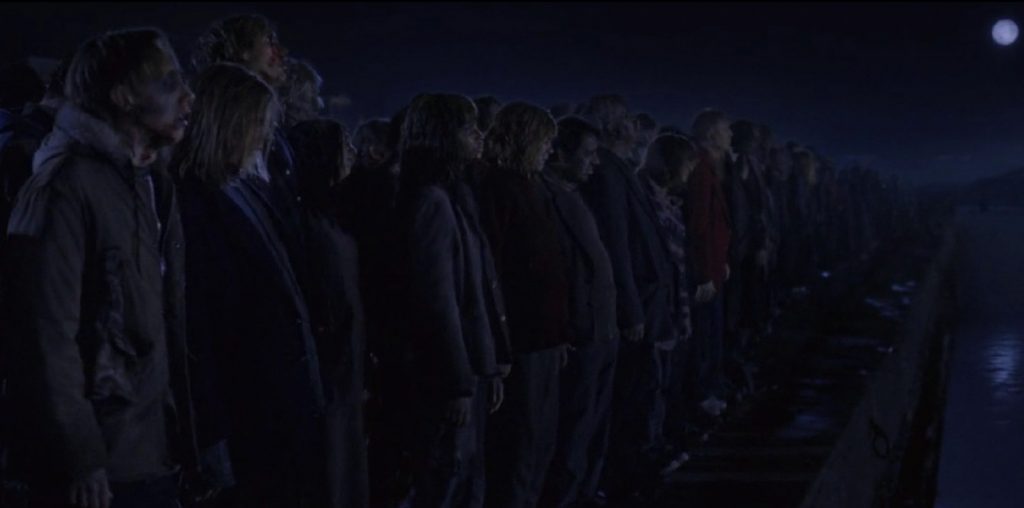
San Francisco Chronicle film critic Mick LaSalle once said: “The Holocaust is too huge an event not to present onscreen – and yet it’s really too huge to present onscreen.” As a result, over the decades we’ve seen many films that shine lights on dark little corners here and there. “The Boy in the Striped Pajamas” is one such movie, concerning itself with a corner of one concentration camp, along a fence where a Jewish boy named Shmuel and a German boy named Bruno become friends. Bruno’s father is the camp commandant, while Shmuel’s father is part of a group tasked with erecting a new building. This gives them the opportunity to spend several afternoons together, chatting and even playing games through the barbed wire, until they hatch a plan with tragic consequences.
I won’t give anything away, but I will say that this is a movie whose ending will punch you in the gut. It’s a finale that loudly speaks to the psychosis and insanity of the Final Solution. While it’s not a typical Hollywood ending – I admit I spent some time formulating a climax that was not so bleak but which still resulted in a comeuppance for the commandant – it’s sadly necessary for driving home a point much bigger than the tale of two little boys and their unlikely friendship.
Bruno’s father is sent from Berlin to an unnamed concentration camp, where he oversees its day-to-day activities. His wife, son, and daughter are not happy with the move, but when Bruno looks out his window and sees a nearby “farm,” complete with children in pajamas, he thinks he has new playmates. The boards nailed over that window in the next scene speak volumes about what his father thinks of that. Of course, some of the household labor is supplied by people from the camp, and soon Bruno’s curiosity gets the best of him, even though he’s been told to stay in the front yard or in the house. Meanwhile, his sister becomes immersed in the propaganda being fed to her family by their tutor, to the extent that she’s clearly become a good little Aryan girl by the end.
The mother is aware of the camp, of course, but she’s willing to believe it’s simply a work camp. Maybe it’s unpleasant, she thinks, but that’s all. When the truth begins to dawn on her, however, she becomes shell-shocked by the guilt. Unfortunately, she chooses to remain a good wife, bound by a sense of duty to husband and country, and tries to make the situation as manageable as possible. By the time she insists that the children should be moved to stay with family, an idea her husband reluctantly agrees to, it’s too late for Bruno and his sister, in different ways.
A few people have criticized the film’s use of British accents, but I didn’t think it was a big deal. Sure, it’s disconcerting at first, but I quickly got used to it. Since everyone in this movie – and many others like it – speaks that way, it’s very easy for your brain to say “British accent = German accent” and move on to more important things.
Overall, this is a film with top-notch performances all around (Asa Butterfield in particular is excellent as doe-eyed innocent Bruno) and a moving score by James Horner. For those who might say we’ve seen enough Holocaust movies, I can only respond that anti-Semitism is still alive and well in today’s world, so, yes, we do need to keep reminding people about that horror. Look at the idiots in Pennsylvania who named their son Adolf Hitler and wanted “Happy Birthday Adolf Hitler” written on a cake, or check out the web sites for groups like World Church of the Creator. Heck, just learn more about the Anti-Defamation League and their ongoing activities.
This disc offers up a few bonus features, starting with several minutes of deleted scenes complete with commentary by writer/director Mark Herman and author John Boyne, whose novel served as the source material. Given the film’s brisk 94 minutes, it’s easy to see where the scenes could be reinserted, as much of them give the story added depth, but Herman outlines his reasons for excising the footage, with Boyne adding his thoughts. In the end, they give you plenty to chew on, which seems to be rare with deleted scenes collections these days.
The pair also appear on the film’s commentary track. It’s a nice conversation peppered with behind-the-scenes anecdotes, discussions of theme, explanations of where Herman deviated from the novel, and so forth. Again, there’s plenty of thought-provoking discussion.
Finally, we have a 20-minute featurette that provides an all-to-brief overview of the making of the movie. “The Boy in the Striped Pajamas” is a movie worthy of a much longer documentary, but given its anemic box office performance (I think the depressing ending had a lot to do with that), I imagine Miramax didn’t feel the need to give the DVD a larger budget. That’s a shame, but hopefully this DVD will sell well enough that a two-disc version will eventually arrive.
